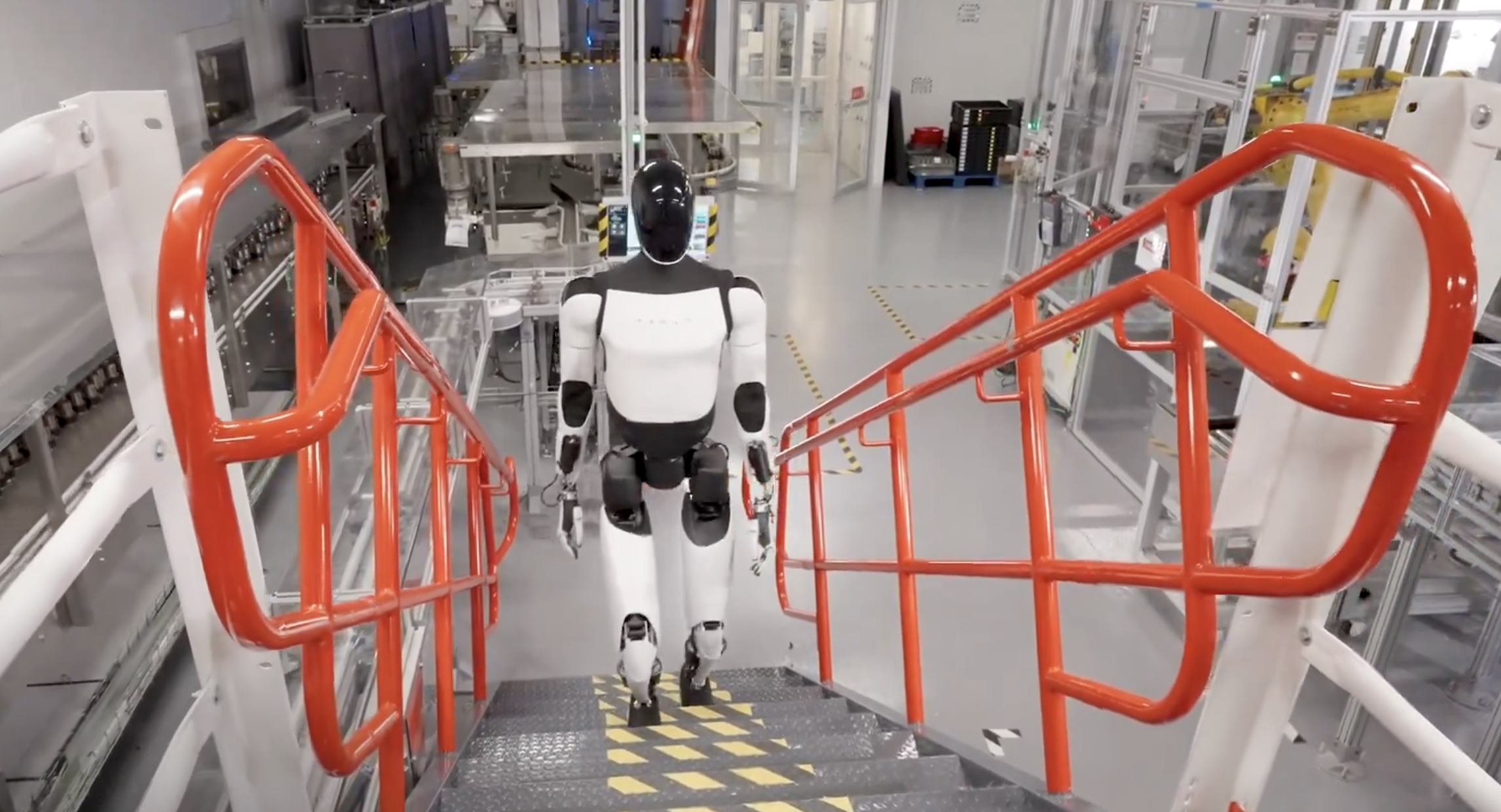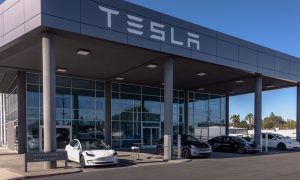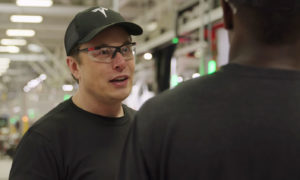

Investor's Corner
Big Oil fights back against electric vehicle revolution, “EVs are not the silver bullet everyone is looking for”
The purveyors of old technologies have always done what they could to impede the adoption of new ones, not only by pointing out the drawbacks of the new products, but also by making their old products better. In the last days of the Age of Sail, shipbuilders crafted super-fast clipper ships, which shared the seas with steamships for many years. Typewriters steadily added high-tech features, evolving into stand-alone word processors before they were superseded by computers.
However, never in history has there been an industry as profitable, powerful and all-pervasive as the oil industry – an industry whose lifeblood is a soon-to-be-obsolete technology. Big Oil, supported by its allies in the auto industry and numerous national governments, is fighting the nascent electromobility revolution on several fronts. Its decades-long campaign to discredit the science of climate change, and its financial support of backwards-looking political figures, are well known. Now that EVs are emerging as an existential threat, industry players are also working to sow doubts about their viability in the public mind – the media churns out “EVs are a bust” articles on a daily basis, often employing quotes helpfully provided by auto industry trade groups and oil-friendly think tanks.
On a somewhat more constructive front, oil producers and automakers are working together to make legacy vehicles ever more fuel-efficient, hoping to delay demand for electric alternatives.
Oil giants including Exxon, BP and Shell are working with automakers such as Ford and Fiat Chrysler to create a new generation of super-slick engine lubricants in a quest to squeeze even more efficiency out of traditional engines. “It’s really important that we are able to squeeze the lemon,” Shell VP Andrew Hepher told the Wall Street Journal. “The combustion engine has still got a long way to run…Car makers are very, very heavily motivated to improve the economy of their fleet.” BP’s CEO Bob Dudley adds, “EVs are not the silver bullet everyone is looking for.”
Governments of petroleum-producing countries are also getting proactive about prolonging the reign of the ICE. The Persian Gulf state of Qatar, which has the world’s third-largest reserves of oil and natural gas, acquired 17 percent of Volkswagen’s voting rights in 2009, becoming the third-biggest investor in VW. “We are really committed to VW,” said VW supervisory board member Hessa Al Jaber. “They are taking steps to mitigate any future risks on emissions.”
A recent article in the Detroit Free Press reports that the Saudi national oil company, Aramco, came to the Detroit auto show for the first time ever this year, to spread the word about its cutting-edge research to improve legacy gas engines.
Above: Aramco cranks up the PR machine with a booth at the Detroit Auto Show (Youtube: aramcoservices)
“In an era of climate change concerns, battery electric vehicles have become a symbol of innovation, promising to disrupt the automotive industry,” said Ahmad Al Khowaiter, Aramco’s Chief Technology Officer. “Yet hidden in plain sight are some of the most disruptive technologies the industry has ever seen; and they happen to be new and improved internal combustion engines.”
“Ironically, as countries announce plans to phase out gasoline- and diesel-powered vehicles in favor of battery electric vehicles, new fuels and engine designs are making internal combustion engines greener than ever, and far more efficient,” Al Khowaiter said.
Aramco has invested hundreds of millions in global R&D – it is the third-largest holder of oil industry patents, behind Exxon and Chevron. It has research facilities all over the world, including in Detroit and Houston, and works with researchers at Stanford, MIT and the University of Michigan.
“Public policy should be technology-agnostic,” Al Khowaiter said. “Neither the battery electric vehicle nor the internal combustion engine is the perfect solution in all scenarios; both are needed for a sustainable and affordable mobility future.”
Donald Runkle, a mechanical engineer who ran product engineering at GM, told the Free Press that fuel economy is increasing every day. “The combustion engine is not going away in the foreseeable future, not for 15 or 20 or 30 years. It has proven, and continues to prove, to be the low-cost approach to moving things. Yes, there will be electrification, adding batteries and all that. It just improves the overall efficiency of the internal combustion engine.”
Obviously, the oil and electricity camps disagree about the timeline for electrification. However, all seem to agree that any technology that reduces emissions is a good thing. Don Anair, Research Director for the Union of Concerned Scientists’ Clean Vehicles Program, acknowledged the conflicting/complementary goals. “We need an 80% or more reduction in oil use,” he told the Free Press. “No matter how you look at it, to address climate change, we can’t continue to power our transportation system with oil. We need to continue to improve emissions from conventional vehicles while we accelerate the transition toward electric vehicles powered by clean energy.”
===
Note: Article originally published on evannex.com by Charles Morris
Investor's Corner
Tesla could save $2.5B by replacing 10% of staff with Optimus: Morgan Stanley
Jonas assigned each robot a net present value (NPV) of $200,000.

Tesla’s (NASDAQ:TSLA) near-term outlook may be clouded by political controversies and regulatory headwinds, but Morgan Stanley analyst Adam Jonas sees a glimmer of opportunity for the electric vehicle maker.
In a new note, the Morgan Stanley analyst estimated that Tesla could save $2.5 billion by replacing just 10% of its workforce with its Optimus robots, assigning each robot a net present value (NPV) of $200,000.
Morgan Stanley highlights Optimus’ savings potential
Jonas highlighted the potential savings on Tesla’s workforce of 125,665 employees in his note, suggesting that the utilization of Optimus robots could significantly reduce labor costs. The analyst’s note arrived shortly after Tesla reported Q2 2025 deliveries of 384,122 vehicles, which came close to Morgan Stanley’s estimate and slightly under the consensus of 385,086.
“Tesla has 125,665 employees worldwide (year-end 2024). On our calculations, a 10% substitution to humanoid at approximately ($200k NPV/humanoid) could be worth approximately $2.5bn,” Jonas wrote, as noted by Street Insider.
Jonas also issued some caution on Tesla Energy, whose battery storage deployments were flat year over year at 9.6 GWh. Morgan Stanley had expected Tesla Energy to post battery storage deployments of 14 GWh in the second quarter.
Musk’s political ambitions
The backdrop to Jonas’ note included Elon Musk’s involvement in U.S. politics. The Tesla CEO recently floated the idea of launching a new political party, following a poll on X that showed support for the idea. Though a widely circulated FEC filing was labeled false by Musk, the CEO does seem intent on establishing a third political party in the United States.
Jonas cautioned that Musk’s political efforts could divert attention and resources from Tesla’s core operations, adding near-term pressure on TSLA stock. “We believe investors should be prepared for further devotion of resources (financial, time/attention) in the direction of Mr. Musk’s political priorities which may add further near-term pressure to TSLA shares,” Jonas stated.
Investor's Corner
Two Tesla bulls share differing insights on Elon Musk, the Board, and politics
Two noted Tesla bulls have shared differing views on the recent activities of CEO Elon Musk and the company’s leadership.

Two noted Tesla (NASDAQ:TSLA) bulls have shared differing views on the recent activities of CEO Elon Musk and the company’s leadership.
While Wedbush analyst Dan Ives called on Tesla’s board to take concrete steps to ensure Musk remains focused on the EV maker, longtime Tesla supporter Cathie Wood of Ark Invest reaffirmed her confidence in the CEO and the company’s leadership.
Ives warns of distraction risk amid crucial growth phase
In a recent note, Ives stated that Tesla is at a critical point in its history, as the company is transitioning from an EV maker towards an entity that is more focused on autonomous driving and robotics. He then noted that the Board of Directors should “act now” and establish formal boundaries around Musk’s political activities, which could be a headwind on TSLA stock.
Ives laid out a three-point plan that he believes could ensure that the electric vehicle maker is led with proper leadership until the end of the decade. First off, the analyst noted that a new “incentive-driven pay package for Musk as CEO that increases his ownership of Tesla up to ~25% voting power” is necessary. He also stated that the Board should establish clear guidelines for how much time Musk must devote to Tesla operations in order to receive his compensation, and a dedicated oversight committee must be formed to monitor the CEO’s political activities.
Ives, however, highlighted that Tesla should move forward with Musk at its helm. “We urge the Board to act now and move the Tesla story forward with Musk as CEO,” he wrote, reiterating its Outperform rating on Tesla stock and $500 per share price target.
Tesla CEO Elon Musk has responded to Ives’ suggestions with a brief comment on X. “Shut up, Dan,” Musk wrote.
Cathie Wood reiterates trust in Musk and Tesla board
Meanwhile, Ark Investment Management founder Cathie Wood expressed little concern over Musk’s latest controversies. In an interview with Bloomberg Television, Wood said, “We do trust the board and the board’s instincts here and we stay out of politics.” She also noted that Ark has navigated Musk-related headlines since it first invested in Tesla.
Wood also pointed to Musk’s recent move to oversee Tesla’s sales operations in the U.S. and Europe as evidence of his renewed focus in the electric vehicle maker. “When he puts his mind on something, he usually gets the job done,” she said. “So I think he’s much less distracted now than he was, let’s say, in the White House 24/7,” she said.
TSLA stock is down roughly 25% year-to-date but has gained about 19% over the past 12 months, as noted in a StocksTwits report.
Investor's Corner
Cantor Fitzgerald maintains Tesla (TSLA) ‘Overweight’ rating amid Q2 2025 deliveries
Cantor Fitzgerald is holding firm on its bullish stance for the electric vehicle maker.

Cantor Fitzgerald is holding firm on its bullish stance for Tesla (NASDAQ: TSLA), reiterating its “Overweight” rating and $355 price target amidst the company’s release of its Q2 2025 vehicle delivery and production report.
Tesla delivered 384,122 vehicles in Q2 2025, falling below last year’s Q2 figure of 443,956 units. Despite softer demand in some countries in Europe and ongoing controversies surrounding CEO Elon Musk, the firm maintained its view that Tesla is a long-term growth story in the EV sector.
Tesla’s Q2 results
Among the 384,122 vehicles that Tesla delivered in the second quarter, 373,728 were Model 3 and Model Y. The remaining 10,394 units were attributed to the Model S, Model X, and Cybertruck. Production was largely flat year-over-year at 410,244 units.
In the energy division, Tesla deployed 9.6 GWh of energy storage in Q2, which was above last year’s 9.4 GWh. Overall, Tesla continues to hold a strong position with $95.7 billion in trailing twelve-month revenue and a 17.7% gross margin, as noted in a report from Investing.com.
Tesla’s stock is still volatile
Tesla’s market cap fell to $941 billion on Monday amid volatility that was likely caused in no small part by CEO Elon Musk’s political posts on X over the weekend. Musk has announced that he is forming the America Party to serve as a third option for voters in the United States, a decision that has earned the ire of U.S. President Donald Trump.
Despite Musk’s controversial nature, some analysts remain bullish on TSLA stock. Apart from Cantor Fitzgerald, Canaccord Genuity also reiterated its “Buy” rating on Tesla shares, with the firm highlighting the company’s positive Q2 vehicle deliveries, which exceeded its expectations by 24,000 units. Cannacord also noted that Tesla remains strong in several markets despite its year-over-year decline in deliveries.
-

 News3 days ago
News3 days agoTesla debuts hands-free Grok AI with update 2025.26: What you need to know
-

 Elon Musk6 days ago
Elon Musk6 days agoxAI launches Grok 4 with new $300/month SuperGrok Heavy subscription
-

 Elon Musk1 week ago
Elon Musk1 week agoElon Musk confirms Grok 4 launch on July 9 with livestream event
-

 News2 weeks ago
News2 weeks agoTesla Model 3 ranks as the safest new car in Europe for 2025, per Euro NCAP tests
-

 Elon Musk2 weeks ago
Elon Musk2 weeks agoxAI’s Memphis data center receives air permit despite community criticism
-

 News5 days ago
News5 days agoTesla begins Robotaxi certification push in Arizona: report
-

 Elon Musk2 weeks ago
Elon Musk2 weeks agoTesla reveals it is using AI to make factories more sustainable: here’s how
-

 Elon Musk2 weeks ago
Elon Musk2 weeks agoTesla scrambles after Musk sidekick exit, CEO takes over sales

















